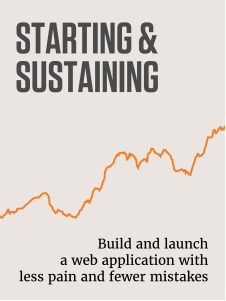#analytics
Chapters and interviews tagged with ‘#analytics’
Related Book Chapters & Interviews
 Interview № 21 of 24
Steve McLeod
Interview № 21 of 24
Steve McLeod
Steve McLeod is the founder of Feature Upvote, a SaaS tool to enable your customers to suggest and upvote improvements. In this episode, we talk about and compare his experiences running both a B2C app and B2B app and the value of having a part-time system administrator on retainer.
It’s incredibly easy to go overboard with analytics, but in the early days it’s going to be difficult to know what to track. More importantly, looking through stats can feel like you’re doing real work without concentrating on what matters. Do the minimum and focus on shipping without getting too deep into analytics configuration.
Like sales, marketing is a fundamental but often overlooked aspect of building a business. There are countless forms of marketing, and many of them aren’t even sleazy. Don’t do yourself a disservice. Understand and appreciate what marketing can do for your business.
You can’t keep an eye on all of the moving parts of your application. At some point, something’s going to fail, and when it does it needs to fail loudly and provide information to fix it. This is where monitoring comes into play to ensure minimal impact when things do go wrong.
Nothing can lead you in the right direction better than spending time with customers and striving to understand their problems and challenges. In the early days, no investment will pay off more than time spent understanding your customers’ needs.
 Interview № 18 of 24
Matt Goldman
Interview № 18 of 24
Matt Goldman
Matt and I talk about running a SaaS business after acquiring it, the mistakes they made early after taking over Churn Buster, and the common ways that SaaS businesses get dunning wrong and how they can do better. We also talk about the value of iteratively improving automation for tasks and how important it is to clearly document and explain manual process.
 Interview № 8 of 24
Josh Pigford
Interview № 8 of 24
Josh Pigford
Josh and I discussed bootstrapping, accepting outside money, the drawbacks of hiring too fast and having to ask his team to take a pay cut. We also talk about how metrics simply aren’t important in the early days and how nothing beats spending time to talking to your customers in person.
 Interview № 4 of 24
Peldi
Interview № 4 of 24
Peldi
Peldi and I talk about moving from California to Italy to lower his cost of living to start a company, juggling different delivery formats for software (and the associated payments challenges), giving amazing support, and bending over backwards to help customers. While he originally didn’t want to grow the business beyond himself, Balsamiq is now a team of 23 people based all around the world.
 Be Fully-prepared to Launch Your Own SaaS Application
Be Fully-prepared to Launch Your Own SaaS Application
Get a free playbook, worksheet, and short email course to help you navigate the journey so you can be ready to build your own SaaS application.